#my meta post about good omens
Text
I always say I don't do Meta but here I am stuck in my head over the Family Systems lens of viewing our beloved Ineffable Idiots.
Crowley, as the Black sheep (scapegoat) has done a lifetime+ (6000 odd years) of unpacking his identity and detaching from his toxic family of origin (Heaven and then the "found" family of Hell). He started to differentiate from Heaven first by reveling in the assigned role of the outcast - being Unforgivable. Because if you are told long enough that you are the Bad One, you will start to believe it, internalize it. But that is only a reactionary identity, not a whole one.
So In GO S1, we see Crowley recognizing his own growth away from even his assigned role. He doesn't identify with Hell anymore than he identifies with Heaven because they both want him to stay quietly and obediently in a box. Whereas all that time around humans, with all our complexities and gray areas, has (I think) helped him realize that boxes just don't work. Obviously his ability to be completely head over heels for Aziraphale has also played a part in this.
With Az, Crowley gets to be the Savior - a roleplay they both clearly enjoy. Crowley gets to be covertly "good" as is still part of his nature. But goodness does not define him and it's very important to him that this remain true. Being "good" is for Angels and the resentment toward Heaven is an unhealed wound. He also gets to roleplay "tempting" Az in a safe, controlled way - since we all know Az wants to be tempted anyway. Through their relationship, Crowley gets to be more fully himself than anywhere else.
Aziraphale reaps this benefit, as well, but he is far less aware of it (on the surface). Because Aziraphale was never cast out, he is still living with the comfortable level of denial regarding the toxicity of his Family of Origin (Heaven). Az still harbors hope that things can be changed for the better, that the people in charge (caretakers) are operating from a place of fundamental Good. Az is the adult who seems to function highly on the outside but is always falling apart within because they still feel that they *do* have to fit neatly into the "boxes" Crowley long ago eschewed.
Azriaphale is a ball of walking Anxiety and Perfectionism because he is still so enmeshed with the exalted expectations of his Family of Origin. He can only "rebel" in secret for the most part. Good Omens 1 is a major moment of growth for him - the first open act of rebellion against the Family. He is able to do so because Crowley has his back (like a supportive partner) and, I believe, at least in part because Gabriel has been such a bully that Az reaches a breaking point with it in that moment. I'm sure it helps that they get to save actual children from harm.
But one big moment of rebellion doesn't mean the cycles of a thousand lifetimes will be automatically broken. Az does well enough with being an outcast of Heaven when it means the bullying and expectations on him are finally relaxed but as we see by his responses to the Angelic visits all through S2, he hasn't truly severed his feeling of responsibility toward the Family (Heaven).
When a major Caretaker (Metatron) steps in to offer Az everything he has never hoped to dream, of course he can only see it as essential. He has never had to process a full break from the Family like Crowley so he truly cannot understand where Crowley is in his emotional journey. Az has basically just had his wounded inner child told that Mummy and Daddy not only wanted and loved him all along but that they now want to give him the respect he never got before.
And Az truly wants to believe this illusion because it fulfills every emotional wounds that was still open within him. Hence why he also lets himself believe that he can be the one who *does* make a difference in Heaven. He wants to genuinely believe that he can bring Crowley back into the Family - where they can both be blissfully loved and accepted. To Az, it's the opportunity to stop hiding and rebelling in secret. To be able to offer Crowley what Az sees as the dearest gift anyone could bestow: Redemption.
Crowley, having seen the two of them as being in far more similar places, emotionally, is blindsided by this. Crowley no longer sees Heaven's acceptance as a positive. He knows how cruel and unjust the Family can be - and has been to him for centuries. He cannot, for the life of him, understand why Az does NOT see it. And Az offering him a return to Heaven is salt in the wound of "you're not good enough as you are." Crowley feels that the only person who has ever felt safe in his existence is suddenly telling him that everything he has worked to be, the emotional mountain he has climbed to be *himself* is worth less than reverting back to the being he was *before* he did all the work.
What Az sees as opportunity for unity, for fulfilling the childish dreams of being "accepted" by their Family of Origin, Crowley sees as a fundamental rejection of himself.
Maybe all of this was obvious and I may have been off about a few things - haven't watched S1 one in about a year. But this was my overall impression and I needed to get it out of my system. Not beta'd or proofread.
Thank you to anyone who actually bothers to read all of this XD
#good omens spoilers#good omens s2#good omens s2 spoilers#good omens#ineffable spouses#ineffable husbands#ineffable partners#ineffable idiots#azicrow#aziracrow#aziraphale#azirowley#crowley#anthony j crowley#aziraphale x crowley#good omens meta#spoilers#go S2#go season 2#go s2 spoilers#family systems#my meta post about good omens#my meta#my go meta
56 notes
·
View notes
Text
Thinking about how Azi and Crowley both are barred from being the people they want to be.
Crowley is a demon who, while still loving chaos and mischief, wants to be caring and empathetic and let the all love in his heart out.
Aziraphale is an angel who, while still loving love and devotion, wants to be a skeptical trickster bastard who can be a little selfish sometimes.
The writing of this story is phenomenal. I'll never get over it.
#yall get tired of my unnecessary meta posts?#too bad sorry#its all i think about#i wanna write this good some day#good omens#crowley#aziraphale#aziracrow#ineffable husbands#ineffable idiots
1K notes
·
View notes
Text
wow so I have like 3 analysis in progress that touch on this topic but I really need to just talk about it rn with its own spotlight.
Aziraphale has this entire life that he's built for himself on earth, after armageddon he's thriving. When we catch up with him in Season 2 his first scene is literally him going to check in with one of his tenants, and throughout the season we see that he has a decent relationship with nearly Everyone on the block. He has an entire life for himself all hashed out and pretty.
Crowley... does not. His cold open in Season 2 is back in St. James park, checking in with Shax, finding out the gossip on Hell. He doesn't have his apartment, he only has his Bentley and the few plants he could fit in it. He doesn't have any other human friendships. His entire life and everything he loves to do is built entirely around Aziraphale.
This is something that I just find so fucking thrilling because when it comes to their characters and where exactly they are in their arcs right now, it's essentially like looking into a mirror.
Aziraphale knows exactly who he is when he's on his own. He nurtures his own relationships with humans he sees often, he's a nice landlord, he loves books and classical music, and hot cocoa. But, Aziraphale still holds onto the ideals of heaven. He still cares about doing good and being forgiving. He still cowers and jumps at the opportunity to help heaven, not because he wants to but because he's supposed to because he's still an angel.
Crowley has nothing. He has his car, which he drives to a secluded location to park every night, only to drive it right back in the morning. He's only even vaguely recognizable because people associate him with Aziraphale and this is fine for him, he could care less. He doesn't really need to know who he is or process his traumas, why would he when he can put all his attention and focus and love and care directly into Aziraphale? His friend, who has always been his friend, the one person who has always stood by him. Who cares about heaven and hell, he has Aziraphale.
When we finally see them on their own and without the influences of their head offices, we see the opposite of what we'd expect, and nearly the opposite of the outcome we see in episode 6. Crowley is the one constantly checking in with Hell (wether he likes it or not), and Aziraphale is the one who's living care free without even thinking about heaven. When he does something good that he wants to report, he just calls Crowley.
this whole dance of Crowley not knowing who he is without Aziraphale and Aziraphale knowing who he is fundamentally but not knowing how to break free from the confines of Heaven that stop him from truly embracing Crowley in the end, it's just so delicious.
#like does this make sense#they themselves are almost foils for eachother#you would expect Aziraphale to be the one struggling without Heaven but he's actually doing fine?#he doesn't even think about rejoining Heaven until Crowley's mentioned but him wanting to help Gabriel at all out of this vague obligation#its just like man he's still in there#and Crowley being completely done with heavan and hell but never truly finding out what that means for him#i hope this makes sense to people#idek if at this rate anyone will see this#my recent posts have been swallowed by the void it would seem but alas ill keep writing them#bi.f.shit#good omens#good omens 2#good omens spoilers#good omens 2 spoilers#gos2 spoilers#ineffable divorcées#aziraphale#crowley#good omens meta#good omens analysis#ineffable husbands
1K notes
·
View notes
Text
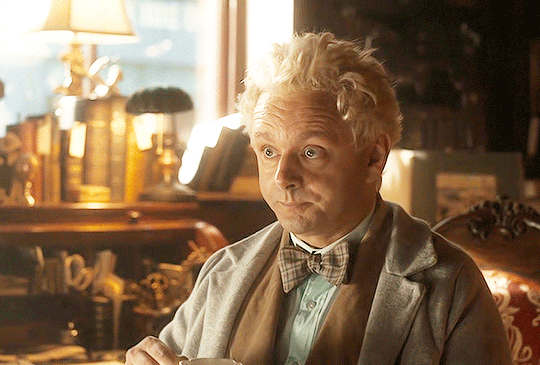
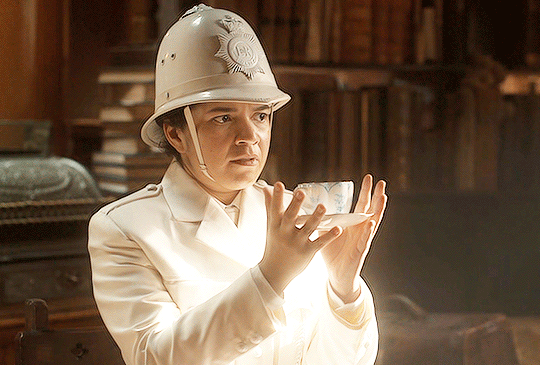
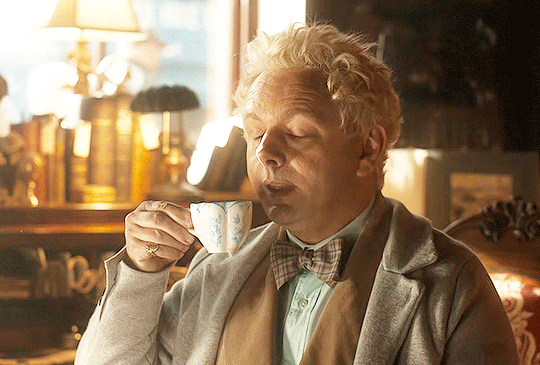
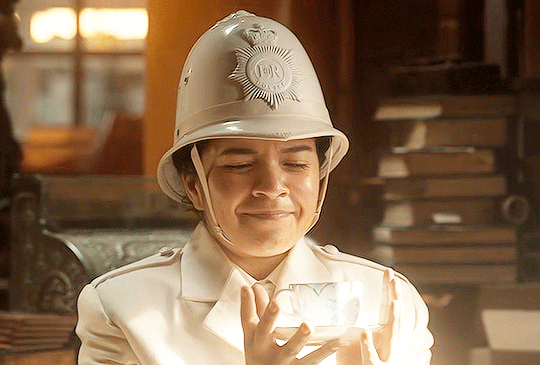
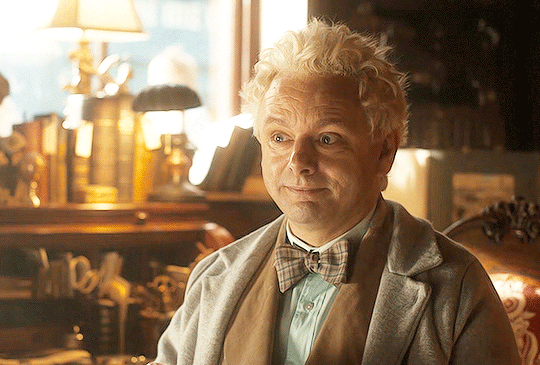
#good omens#aziraphale#muriel#goodomensedit#tvgifs#tvedit#my gifs#gifs#can I meta on my own post?#obviously I love how precious they are both being#muriel is the sweetest thing#and aziraphale respects her boundary about the tea which kudos for that#but his face isn't just sympathy#it's empathy#he must remember what he was like before crowley temped him#he also bought into heaven's propaganda that human stuff is wrong or gross or not fit for angelic consumption#but crowley showed him it is good and wonderful in its own way#and I think he is reliving everything muriel is missing out on in that moment
582 notes
·
View notes
Text
The way Azirphale is underestimated and practically infantalized by heaven is so closely tied to his femininity and I think we should talk about it more because I just want to shout about how relatable the way he's treated in his workplace is as a woman working in a traditionally male field
It's in all the little niggling comments from your boss about personal things that hold no bearing on your work
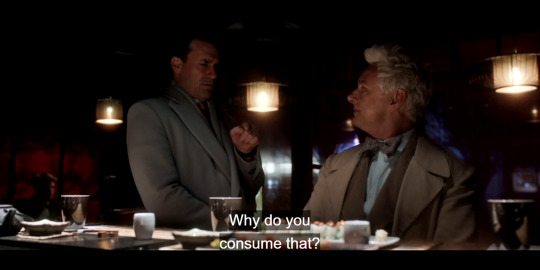
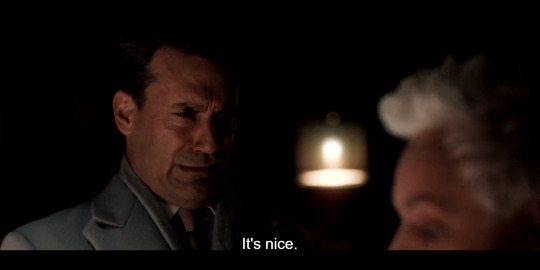
and the assumption that what you're doing must be simple if it was assigned to you
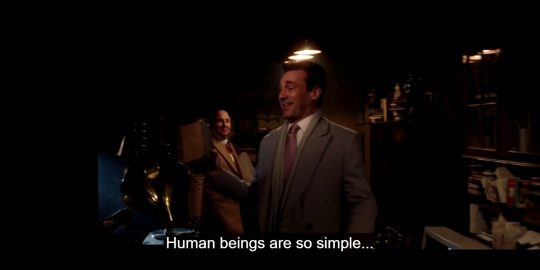

your work is trivialized
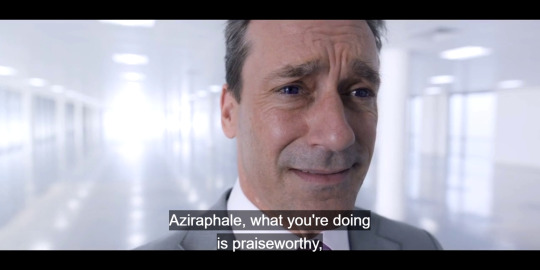
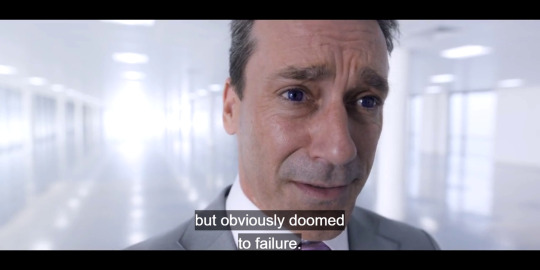
and you get these the placating smiles when you're told plans and proposals are rejected and passed over
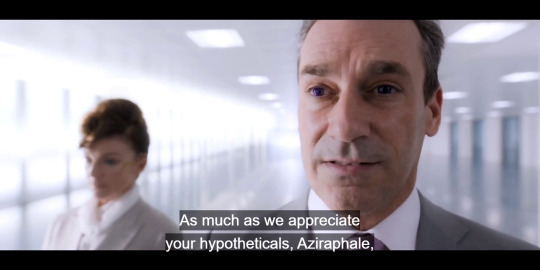
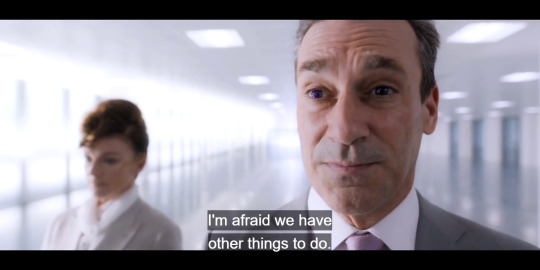
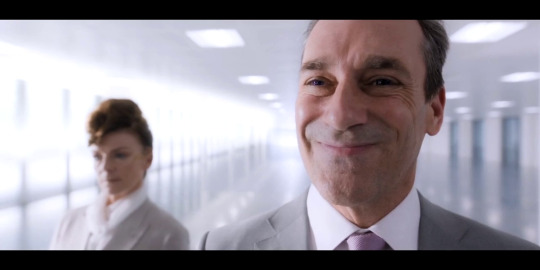
or when your complaints are dismissed

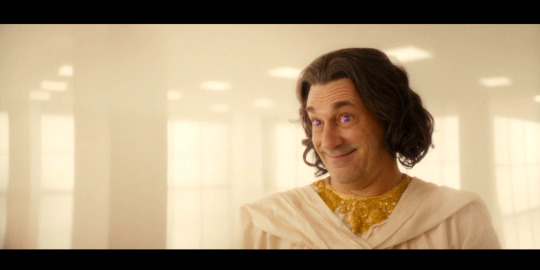
and you get more of the same from upper management
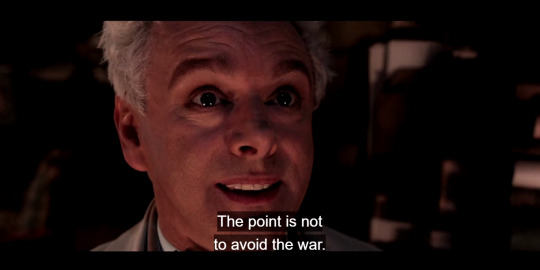
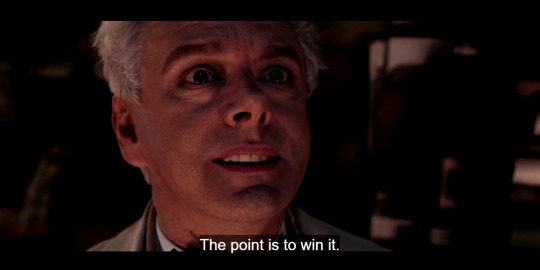
it all feels so frustrating and draining but you're at work so all you can do is take a breathe put on that mask and move on with your day
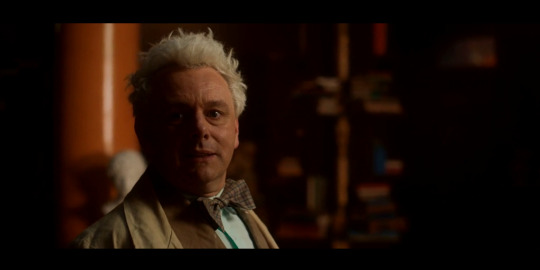
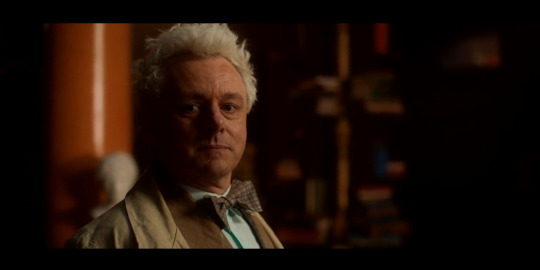
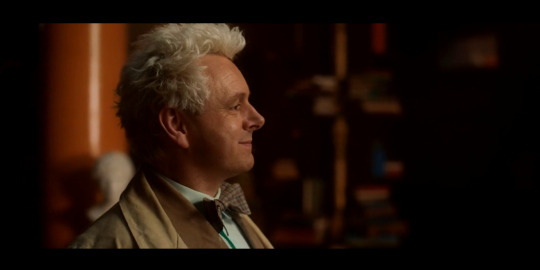
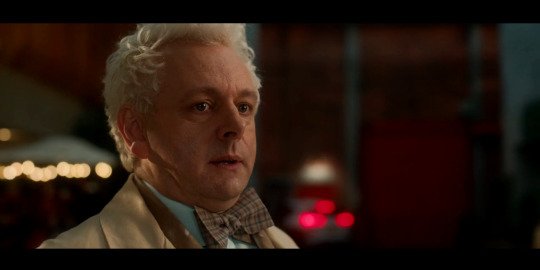
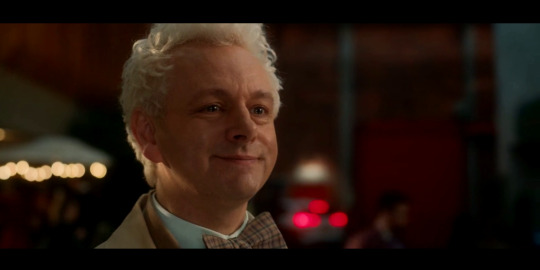
It is all so deteimental to your emotional well being and textually, so much of this is tied to Aziraphale's softness, his gayness - his femininity
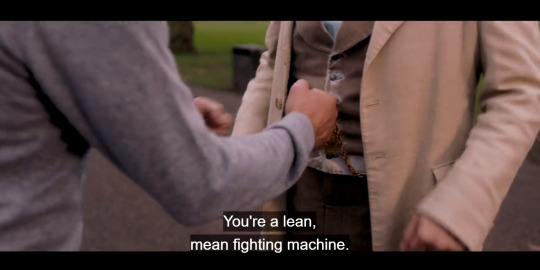
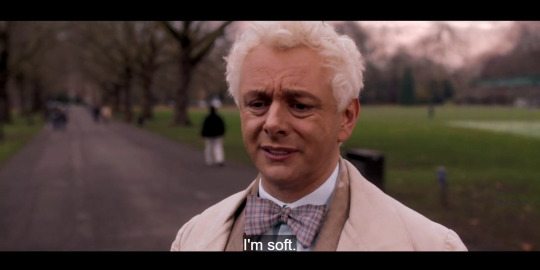
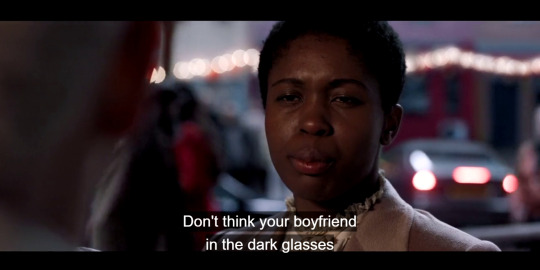
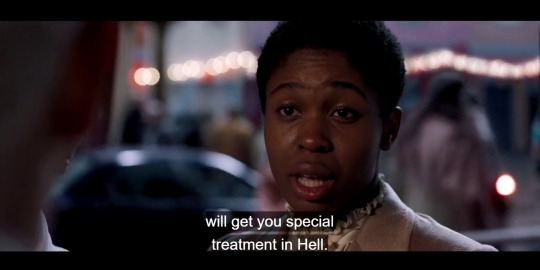
The thing about working in an environment and gives you this feeling - of being simultaneously destrought watching your belief in yourself get chipped away but also just so irate becuase you know you don't deserve it - is how it builds. It sinks under your skin and feeds into this indignant dejection until you can have a moment of release - but Azirphale doesn't get to bitch about it over drinks with friends, he doesn't get a lunch break where he can go for a walk and listen to an angry scandi death metal playlist, he doesn't even get the chance to cry about it in the bathroom for 5 minutes before confronting it again
(And I talked a little bit about it in the tags of this beautiful photoset but this all comes into play whenever Crowley dismisses his plans or calls him an idiot. These are purely emotional reactions; I really don't think Crowley means much by it - he respects Aziraphale's opinion and genuinely thinks he's brilliant - but Crowley is so quick to use this terminology when Aziraphale is making a decision Crowley thinks is wrong and he doesn't know how much this hurts Aziraphale. Just like Aziraphale doesn't understand the true impact the Fall had on Crowley, Crowley doesn't understand the ways heaven has been tearing away at Aziraphale's self worth)
Aziraphale has been facing this constant drip of denigration since before the beginning of time and has never released the pressure valve. At this point, he's a bomb waiting to go off
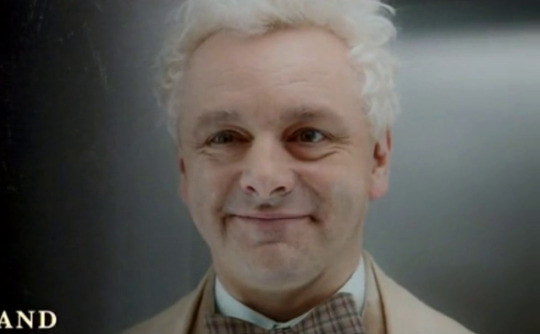
#(I want to note that I am coming at this from my personal experience as a woman#but I know femme neurodivergent and disabled folks of all genders face these same issues)#along similar lines I have tons of feelings about how often Aziraphale hides his hands when talking to other angels#to hide his stimming#and look I try not to tie everything back to explaning why Aziraphale ended s2 the way he did but apparently I can't#its just the juiciest character moment to me#also thinking about how angry Crowley was at Gabriel when he was treated like this once#granted shut up and die already IS the worst thing Gabriel has said to Aziraphale but if Crowley knew how much of this was going on...#aziraphale#good omens#go2 spoilers#good omens meta#Thanks to folks who responded to my tags on that post because you really motivated me to find these screen caps#and finish this post which has been sitting in my drafts for ages#also sorry so many of gabriels faces are funny I cant help that jon hamm is comedy gold - i refuse to let it undermine my point
1K notes
·
View notes
Text
Obsessed with this scene and will be forever; A very long meta.
Your ‘exactly’ and my ‘exactly’ are different ‘exactly’s’
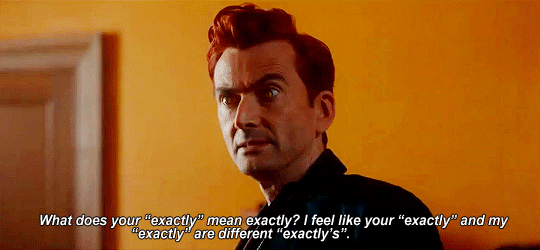
The Scene.
Crowley’s exactly means “We need to be safe and together and away from danger. Let me keep you safe.”
Aziraphale’s exactly means “We need to help because it’s the right thing to do, and we fix things when we’re together.”
Note though, that this is the only time they clarify with each other, and they don’t actually say what they mean, they say what they want to do.
“Let’s drop him off and leave him.” Vs. “Let’s take him in and help him.”
The dissection of this also poses the question, Why does Aziraphale think helping Gabriel is the right thing to do?
And the answer is; Crowley gives him the courage to do what Aziraphale thinks is the right thing and not what heaven decrees is good.
And we can come to this conclusion because Aziraphale for the first time ever, immediately and without hesitation, goes against heaven’s will, without having to be convinced or going through a cycle of indecision or guilt. This is… A. Big. Deal.
Season One.
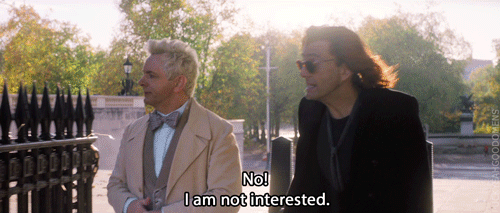
Heaven’s good requires Armageddon to be complete, and under-way. And what does Aziraphale first say about it? “It’s all going to be rather lovely.” “I am not interested[in stopping Armageddon with you].”
Aziraphale loves the earth in this scene. He loves the people on it. He loves all the creatures great and small. He loves Crowley, too. And he still refuses. He needs Crowley to convince him, and even then he still thinks heaven will see sense once he fixes everything. He still believes that right, and good, and holy are the same thing. Even if sometimes he doesn’t agree with it.
Now, let’s go through some history. Between the two of them, for sure, but mainly Aziraphale’s.
An act of defiance; The giving away of a flaming sword. The guilt and worry Aziraphale feels after giving Adam and Eve a chance at survival is not something he gets over quickly. He worries that it was the wrong thing even though it felt right. And the problem isn’t the system that would make doing a good deed the wrong thing, the problem is him. The problem is Aziraphale.
Compliance; The flood. The crucifixion. “God’s a bit tetchy” he says before Mesopotamia is decimated. Aziraphale is clearly uncomfortable with the will of heaven here, but he does not disobey. He does what he is told because the will of God is good and right and correct. He does this same thing with the same reasoning during the Crucifixion of Jesus in 33 AD. Crowley gives us context with a few lines, “Your lot put him up there.” “I showed him all the Kingdoms of the world.” We see a demon who still doesn’t understand why good is so cruel, and knowledge is so evil. And we see an angel that refuses to be conflicted despite his own inherent morality. Because Aziraphale understands why Crowley has questions, he has them too by now. However, Aziraphale has something Crowley didn’t; he has the knowledge of what good intentions and well-meaning questions get an angel.
Doing bad in order to do good. Let’s talk about the Job mini-sode, because let’s be completely real; I’ll never be done talking about the Job mini-sode.

Aziraphale starts this episode thwarting evil. Something he is not conflicted about. You have to thwart evil when you’re good. That’s the whole dance at this point. Crowley stops the dance though, he presents a permit. A permit from a higher authority. Meaning that Crowley, the demon, is performing the will of not only Hell, but also of Heaven. A theme that IS THE WHOLE POINT OF SEASON 1. For all their want of a war, heaven and hell want the exact same thing.
Crowley even states, “The real ‘Big One’ will be between ‘all of them’ and ‘all of us’”. At the end of Season 1 Episode 6.
Aziraphale is horrified by this “permit”. And he goes to check on the validity in heaven, and well. He finds out that it’s real. He doesn’t go higher after that, because he knows you don’t question. He knows he can’t ask why? So he goes to Crowley. If Crowley doesn’t do the evil thing, then Aziraphale doesn’t have to break the rules to thwart it. And well, even though Crowley is a demon, Aziraphale doesn’t actually see him do demonic things all that much. Aziraphale still thinks that Crowley acts like an angel. He’s even starting to think that Crowley is on the side of good. Good being heaven. Crowley denies this, but Aziraphale doesn’t listen. Crowley says, “Kill the blameless Children of Blameless Job” and Aziraphale isn’t going to stop him. The demon has a permit after all. But then something miraculous happens.
A crow, bleats.
Aziraphale looks at a demon defying heaven, defying hell, and doing good. He doesn’t know it yet, but this is his first glimpse of their side. At this point, Aziraphale still thinks Crowley is a little bit on heavens side, because the demon is a little bit good. But then Crowley keeps saving the Children. Crowley stands before angels and he lies to save the children. He does something bad to do something good. And then.
So does Aziraphale.
An angel lies to save children. And then that angel thinks that decision is his undoing. He readies himself for a fall that never comes. Because Crowley is going to keep his secret. This is where Aziraphale once again starts acting with his own moral code. It’s important to remember something important though. Aziraphale still thinks he’s the one who’s wrong. Not heaven. The birth of “their side” coincides with the saving of Job’s children. But there’s a problem.
It doesn’t mean the same thing to each of them. To Crowley it means and end to his loneliness. To Aziraphale it means the beginning of his millennia long struggle of reckoning good with right. Their “exactly’s” don’t match, and they don’t clarify with one another.
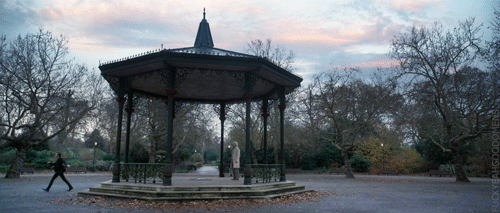
The Book and the Bandstand; Aziraphale doesn’t tell Crowley. He doesn’t say, “Let’s go save the world, I found the anti-christ” He says, “Why would I know his shoe-size?” And Crowley doesn’t suspect a thing. Ouch. They disagree on how to continue. Crowley wants to cut their losses and run away. He wants to do this because he thinks they’ve already lost. And Aziraphale doesn’t give him a reason to hold on because despite everything, Aziraphale wants to be good in the heavenly way. He wants to give heaven a chance to do good, too. A higher authority will surely agree with him. And now, he has the courage to ask. Only after he is turned down by heaven does he make his own decision. He steps into ‘their side’ safely, because Crowley had built it that way.
And he saves the world. With Crowley, and the Anti-Christ, and a series of human beings.
Aziraphale retreats to the safety that Crowley has built for them and that he himself has built as well, despite constantly looking over this shoulder. And he finds comfort there. It is the entire reason he finds himself comfortable making his own choices in Season 2, regarding what is good. It’s why he helps Gabriel, and it’s how he gets Crowley to do it too.
You might even say that Aziraphale embraces ‘their side’ more than ever in Season 2. He includes Crowley in all of his plans, excitedly tells him information he finds, calls the bookshop, the Bentley, and their existence, ours. Oppose this directly with Crowley who, in the name of keeping Aziraphale safe, actually just keeps him in the dark(The threat of extreme sanctions, Gabriel’s trial, etc.)
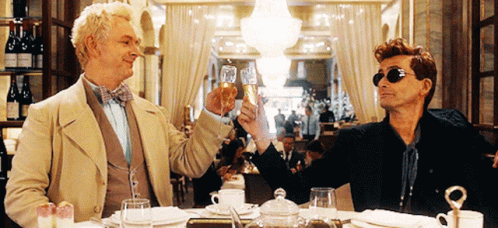
Exactly vs Exactly; AND STILL THE ENDING MAKES SENSE. I have a whole meta HERE about the reason Aziraphale made the decision he did, but I want to talk about it a little bit more. Because it’s the same problem. Their “exactly’s” are different, and neither of them asks the other to explain why.
In this particular case of the ending scene of Season 2, in place of the phrase “exactly” they use the word “together”.
Aziraphale wants Crowley with him in heaven, because they fix things when they’re together. And Aziraphale has faith they they can fix heaven. “We can be together” is how he presents it to Crowley. Crowley rightly sees this as naive, and he’s upset that Aziraphale thinks he wants to be something he’s not anymore.
He finds it hurtful that Aziraphale wants him to change.
“We can go off together” Is what Crowley counters. He says all of this is awful, please let us go off somewhere the danger isn’t. Let me keep you safe. Aziraphale doesn’t want to run away. He wants to save the world again. He wants to save it with Crowley. He wants them both to be good, too.
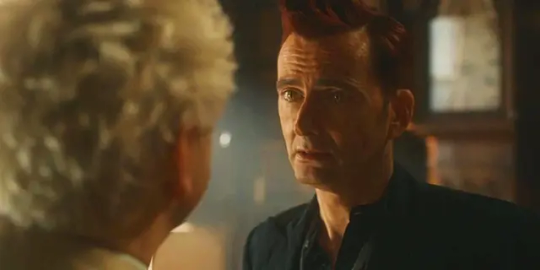
IT’S THE SAME ARGUMENT.
Only Crowley doesn’t let Aziraphale win this time. Aziraphale isn’t right this time. And Crowley isn’t wrong. (I mean I don't think he's right either, they need to find a compromise that isn't the toxicity of heaven and isn't the loneliness of running away.) This time he says, “It’s finally too much, you’re finally asking me to do too much.” Crowley for the first time ever, when asked to make the decision between the two of them, chooses himself. Neither of them explain themselves, and neither of them asks the other to do it either. Because asking questions has always been dangerous for both of them. Anyway, this season makes my brain buzz and I love the ending so much.
#its the “Let me fix it for you” but hearing “Let me fix you for it” dilemma that I said in my Job post#good omens#good omens meta#good omens 2#good omens 2 spoilers#good omens spoilers#go2 spoilers#okay? okay.#but instead its exactly? exactly.#and instead of sweet its actually heartwrenching#I won't stop talking about this EVER
561 notes
·
View notes
Text
Thinking about the GO kiss (of course) and how that strange versatility of the pairing in general extends also to this. The fandom’s grief is so universal because each person sees in it exactly what will hurt them the most.
To this aromantic, Crowley’s desperate gesture looks like: “is this what you want? Will this make us real to you? If I show you I love you in the right way, the human way, will I finally matter enough for you to stay with me?”
#gos2spoilers#good omens#good omens meta#idk if this is really meta#it’s just a thorn I wanted to extricate from my chest#and of course the point of this post is that all interpretations are valid—I hope I don’t have to put that in later#I always get so nervous about aro stuff in fandom#but I have what they used to call a nervous disposition#prescribe me some sea air#balancing my humors by letting out the angst#Aromantic#the hot dog did this#onion’s nighttime thoughts
315 notes
·
View notes
Text
aziraphale was gonna say 'i cant' but says 'i forgive you' instead because hes not closing the door on loving crowley, thats all out of the woods now. by saying 'i forgive you', he's telling crowley the things he can never truly say out loud.
'you've exposed us and our truth. there are threats now, more than you know. and i need to fight it harder than ever now before i can say i love you. because i would be losing you. and losing you forever is worse than the temporary.'

#good omens#good omens season 2#good omens meta#aziraphale#crowley#aziracrow#ineffable husbands#i said this in a convo about GO2#and i think i broke my own heart???#so i need people with me on this#i should rewatch the show#gomens posting
366 notes
·
View notes
Text
"Zira" "Azi" "Az" SIGHHHHHH
is anybody else irritated at the widespread fandom nicknaming of Aziraphale and fucking nobody else? is that just me? because it really feels like a "oooh [wince-hisses through teeth], no, that's too long and weird. that's too hard. i'm gonna call you This instead" situation, and i do not care for it. it pissed me off when i was writing good omens fanfic thirteen years ago and it pisses me off now. you care enough about everyone else to get their names right, all the unusual demon and angel monikers, but oh no, Aziraphale, oh that's ten whole letters, that's way too long. oh you're not gonna bother to type all that, no, his name is just Zira now.
and like, he's not real, so this super duper does not matter and isn't deeply and incredibly shitty the way it is when it's directed at real people. but it still rubs me the wrong way every time i see it. that's not his name! why is his name not good enough for you to take the time to type out the way you do for everyone else! ugh.
#i dunno. i dunno.#i am hoping posting this gets it off my chest and helps me stop being quite as fucking annoyed about it#this isn't directed at any one person#this is widespread#i haven't seen nicknaming to this degree in ANY other fandom#which is why i can't just tell myself it's a friendly nickname because he's likeable and familiar or whatever#it's definitely a Me Problem but there's so many good posts i haven't reblogged#or have sighed while reblogging or just straight up have stopped reading because of this#i do realize that for a lot of folks#it's probably just that they've seen other people doing it and figured it's just part of the good omens fandom culture#i don't care :/#NOBODY ELSE gets nicknamed like this#aziraphale#good omens#good omens meta#dal is a rage demon#it's been long enough that i think i can add these tags now without it hitting the top of the tag as a 'hate tag'
110 notes
·
View notes
Text
Mr Brown's Ensemble at the Ball
I think this officially marks the moment I've moved from obsessed to completely unhinged. It was only a matter of time. Welcome one and all! Here I loose my mind over the fact that Mr Brown is seen revived in line for the coffee shop wearing his outfit from the Dirty Donkey, NOT his outfit from the ball. But to back up, let's start here:
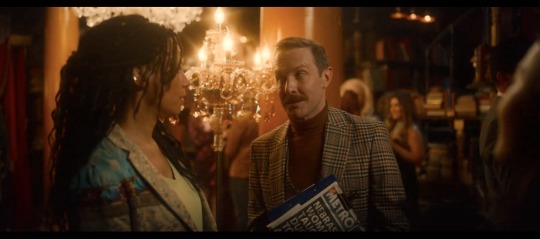
There's already been theories about how Mr Brown's outfit at the Whickber’s Street's Ballroom Meeting resembles Crowley's from when they met at the pub because Mr Brown has a pash on Aziraphale (also infamously blogged about here). Just as a reminder (in case anyone could forget) I'm referring to this outfit...
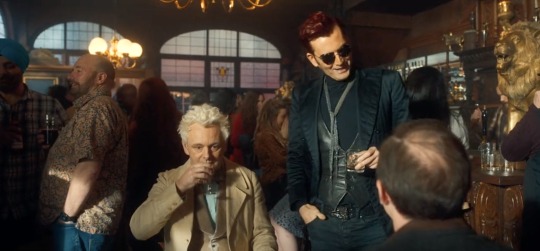
And the fact that Mr Brown shows up at the ball in a turtleneck and vest and jacket much like we see above, however with the vest and jacket in tartan that looks suspiciously similar to dear Mr Fell's bowtie.
I had headcanoned that Mr Brown dressed himself like this at the ball on purpose to catch Aziraphale's eye, but upon latest rewatch I caught this:
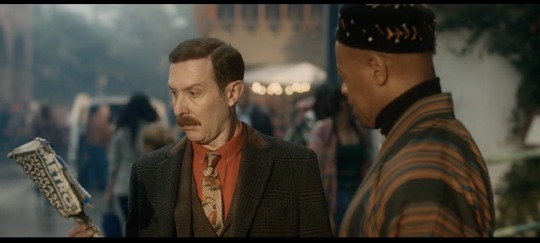
The next morning, Crowley brings Mr Brown back wearing the exact same outfit that he was wearing from the other day at the Dirty Donkey:
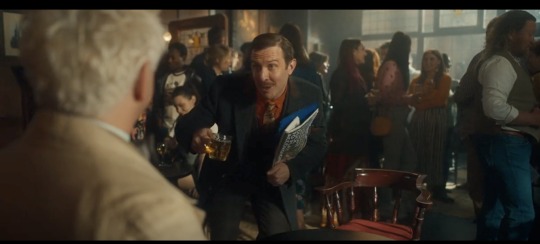
Aaaand this is where I completely lose the last shred of my sanity to this show. Does this mean
Crowley noticed Mr Brown dressing like him and did not care for it and deliberately brought him back in the outfit he'd seen him in before??
The outfit was miracled, and when Crowley brought Mr Brown back from the dead (have we confirmed officially that he died? I can't remember) or from whenever he’d been in the demon’s clutches, he brought him back in his pre-miracled outfit, either on purpose or because the miracled outfit had disappeared upon death/whatever happened to him?
Furthermore, if Aziraphale is miracling the outfits, then he miracled Mr Brown's ballroom ensemble to both look like Crowley's usual outfit AND complement his bowtie?!? SCANDAL!!! Jk, we all know Aziraphale only has eyes for Crowley which leads me to speculate that...
The ballroom outfits were not chosen by Aziraphale, but instead his magic allowed each person to create their own outfit of choice from their subconscious/imagination that would make the event feel more special or perhaps more romantic for them. Has anyone else done a meta about this already? I only remember reading one getting into lapels and allegiances from the ball outfits. However…
If his outfit was miracled and he was revived in the pre-miracled outfit, it seems odd that Mr Brown would have been wearing the exact same outfit from a few days ago. I don't think we've seen any of the other Whickbar street characters wearing the same outfit on a different day, although there are a potentially suspicious amount of extras that do. Does this costume repeat have anything to do with the extras wandering around in the same outfits? Otherwise…
This brings me back to the theory that Crowley made a choice to revive Mr Brown in what he had previously seen him wearing regardless of what he had gone to the meeting in. Maybe because his memory of the previous night was faulty? Or, going back to option #1, he simply did not care for Mr Brown stealing his and Aziraphale’s looks.

For those still reading, let it not be said that I left any stone unturned. Here is Mr Brown entering the bookshop. This is shot in what seems to be the exact same way both Nina's and Mrs Sandwich's entrances are shot, where we see each of them already wearing the changed outfit from the first glimpse we get of them standing outside the door.
One could extrapolate from this that his outfit was changed like Nina's and Mrs Sandwich's, but we don't actually see him walking up to the bookshop beforehand, so I couldn't definitively say from his entrance alone if he came to the meeting dressed this way or if this is his miracled ensemble.
Thanks for joining me on this unhinged adventure!
#good omens meta#losing my mind#yes I have made very few original posts and yet two are them are now about mr brown#what has he done to me?#unhinged meta#good omens theories#good omens s2 analysis#good omens s2e5#good omens clues#good omens costumes#good omens s2#mr brown of browns world of carpets#whickber street shopkeepers and street traders association
66 notes
·
View notes
Text
crowley not wearing his sunglasses when he's around aziraphale in the bookshop in series two is basically symbolism for his world being lighter when aziraphale is around and darker when he's not there
which means that when he, inevitably, starts wearing his sunglasses all the time in series three whilst aziraphale is off in heaven, it'll mean there's no light and his world is completely dark
which would make aziraphale being the one to gently remove the sunglasses, thus bringing that light back to crowley's world, all the more beautiful
#good news everyone i have more Thoughts about the guys#crowley#aziraphale#ineffable husbands#good omens#aziracrow#crowley x aziraphale#crowley good omens#aziraphale good omens#good omens thoughts#good omens meta#kinda#my post
33 notes
·
View notes
Text
"I didn't mean to fall. I just hung around the wrong people."
The only person we see Crowley talk to in Heaven, the first person to stop and lend a hand, was Aziraphale. Crowley wasn't asking questions until Aziraphale asked all sorts of questions in that scene, "Was that you? Which way up does it go? [Ready] for what? Is that it? Hello! I'm Aziraphale [What's your name?] Is something meant to happen? You made it all yourself? What's it for? What exactly does it all do?" All the while, Crowley doesn't ask much back or stray from his ideas really at all. That is, until Aziraphale tells Crowley things no one told Crowley even though he 'Worked closely with upstairs,' like how it's supposed to only run for 6,000 years, and what Earth is, and what people are. Perhaps he had never asked about any of those things. He didn't seem so curious before he met Aziraphale, who popped questions off left and right. Either way, they kept that information from Crowley for a reason, and we can see why, when he's so upset he goes right Upstairs to demand a suggestion box. Aziraphale doesn't even tell Crowley he's wrong. All he does is suggest there could be bad consequences if they stepped out of their 'place'.
Gabriel didn't humor humans' silliness for a second until he checked in on Aziraphale repeatedly. When you look at their interactions chronologically, each time he pops in to check on Aziraphale, he acts a bit more human. Asks more questions as to why Aziraphale does what he does, even starts to dress like them and act like a human instead of being unseen unless he decided a human could see him, as he did before. He picked up JOGGING for goodness sake. Aziraphale rebelling against Heaven and suggesting that perhaps Gabriel couldn't know God's Ineffable Plan triggered Gabriel to abandon his post at the top, only lesser than The Metatron, and inspired both him and Beelzebub to find love. Presumably, this is the second Archangel to leave after chatting with Aziraphale a bit too much.
Aziraphale was on apple tree duty, but instead of protecting them from Crawley, he gave Adam and Eve his sword to protect themselves as God sent them away.
"Wrong people," indeed.
#good omens#good omens meta#good omens 2#good omens 2 spoilers#my husband suggested maybe it was Aziraphale's fault (at least partially) why both crowley and gabriel have fallen#and i cant stop thinking about it#of course gabriel didnt officially fall bc metatron didnt want to look bad but you know.#aziraphale was on apple tree duty#my text posts
41 notes
·
View notes
Text
When you're trying to adult and get real life things done but a small brain itch turns into another full on meta analysis essay.... help!
I can't stop overthinking about Good Omens and it's becoming a serious problem.
And the only cure is a Season 3 with a dash of South Downs Cottage ending D:
#Good Omens#GO#I've seriously got like 3 mini essays in the works that I can't stop thinking about#when did my tumblr become a GO theory/speculation/meta blog? LOL#ineffable husbands#ineffable idiots#give me season 3 or give me death#good omens meta#good omens speculation#good omens analysis#ps. I totally read and love all the replies and tags to my previous posts. thank you everyone for taking the time to indulge me! <3
40 notes
·
View notes
Text
does aziraphale understand suffering?
i spent quite a while last night thinking about this topic following reading this thought-provoking analysis from @lstarart which, as the first bit indicates, early-days aziraphale only understood what it is to suffer in the abstract when it has a direct link to whether or not someone is Good (summarising very poorly!). nonetheless, i thought perhaps the concept of suffering according to aziraphale might need exploring a little further.
(warning: very long post - frankly it's just self indulgent)
suffering from lack of self-worth
one of the most heartbreaking moments in s2 for me is when in ep6 it seems that shax has a penchant for driving right at the heart of insecurity. she demonstrates this with maggie and the insult she directs at her, which to me acts somewhat as a parallel for crowley, culminating in the line “you are unloved, and unlovable. you’re nobody, and you’ll live - and you’ll die - a nobody.” now first of all - crowley isn’t there to hear it, and so only the audience can draw this as a narrative parallel. second - maggie’s reaction is to rise up to meet shax, and fight fire with fire; she looks first back at nina, perhaps for conviction or strength, says to the demons, “my god, you lot are pathetic.”, and appears instead to own those insecurities and refuse to be ashamed of them.
but then shax later turns her attention on aziraphale, who doesn't have that same conviction nor bolster from crowley being physically present, and shax directly drives at the heart of things about him of which he ought to be ashamed. we’ve always seen these elements of aziraphale as being the most lovable parts of him, and are what makes him the enigmatic and dynamic character that he is. however, as is hinted in s1 and now becomes abundantly clear, aziraphale guards these deep in his soul as being his deepest faults, cracks that he has ignored as they have widened, and has carried as a mark of him being lacking:
“Aziraphale… what are you? Crowley’s emotional support angel? The softest touch. The one who went native. Do you need more big, human meals, Aziraphale? Shall we send up the sushi?”
ive written about this before, so a lot of this is going to be repeated, but my thought process on these particular ‘faults’ is this; it is not beyond belief that aziraphale has major issues with self-worth and feeling like he isnt ‘enough’. what shax strikes at are, as i said, elements of ‘fault’ within aziraphale that we have had glimpses of through s1 and into the earlier episodes of s2; she remarks on his propensity for indulgence (sushi/meals), his tendency to be overtrusting and naive ("softest touch"), his lack of traditional angelic quality ("went native"), and the question of what exactly crowley feels for him and what purposes aziraphale serves in their dynamic (emotional support angel").
the way i see it is that aziraphale looks to two sources when evaluating his own self worth; heaven (and possibly god by extension), and crowley. heaven and the archangels completely disregard aziraphale, and are condescending and reductive in how they perceive and interact with him, with gabriel going so far as to insult his corporation (an insecurity that, iirc, we can even glean directly from the book when aziraphale reacts 'with disappointment' to the body he is in after adam splits him from madame tracy).
and crowley? well, to my mind, crowley’s dispensation to overprotect (whilst coming from a good place, of that i’m certain) reduces aziraphale’s agency, especially when crowley essentially talks over him in ep5 (and at other points too), and i could imagine leaves aziraphale questioning what exactly he is able to contribute to their relationship other than being a receptacle for crowley’s sense of loneliness and desertion. we know that's not the case, that it's infinitely more than that, but i could imagine that in this sense of feeling dismissed, aziraphale could see it like this.
then we have the two occasions where crowley strikes at aziraphale in regards to his naivety and belief, (“how could someone as clever as you be so stupid?”, “you’re better than that, angel!”) which, whilst is entirely valid from crowley’s perspective - because aziraphale is naive in his belief in higher power being willing to do the right thing, or be better - from aziraphale’s perspective, he’s struggled through millennia of reconciling his belief system and whether or not the side that he ‘belongs to’ is in fact Good or Right, and he in this he's still struggling. but hes getting there, and crowley has effectively been by his side guiding him through this monumental shift in his psyche; to have it turned on him in this manner had to hurt, even if he knows/realises after the fact that crowley was right.
imo, all of these elements strike at the notion that aziraphale is not “good enough”, especially in the eyes of the two entities to which he needs most to in fact think of him as enough, exactly as he is, in order to affirm any sense of self-worth. as i said in another post on this point:
“he's good enough to guard the eastern gate, but not good enough to keep adam and eve from temptation. he's good enough to guard and monitor the antichrist, but not enough to be truly accepted as part of the heaven hive (his physical sentry post on earth notwithstanding). he's good enough for crowley to run away with to alpha centauri, but not enough to convince crowley to choose to stay and fight with him to prevent the apocalypse… right up until ep6 when he's good enough to be loved by crowley enough to spend eternity with, but not enough for crowley to sacrifice his hang-ups with heaven and help him rebuild it as a team so noone else ever has to suffer what they both did.”
what point am i trying to reach here, as regards aziraphale’s perspective on the concept of suffering? well, to me, in this context, he knows suffering very well. he knows suffering of the personal kind, and it has never left him. It might have burrowed its way down, hidden under the affirmation that ‘i’m happy with myself, and crowley seems to want to know me, so it’s fine’, but it never has left him. he has been essentially ignored and neglected and traumatised by his experience with heaven, and slowly dismantling that belief system has been difficult and painful. however, instead of resolving to replace the source any sense of self-esteem with a belief in himself, he appears to have instead replaced it with crowley. and that's not fair on crowley, to be put on that pedestal (yes, my favourite topic of pedestals rears its ugly head).
aziraphale takes the opportunity with heaven given by metatron not only as one that would prevent further harm to him and crowley but also to others, an opportunity arguably of a more altruistic kind, but he sees it as an assurance that he, as himself (someone who is not wholly Good and in fact has faults), is what is needed to bring change to a broken system. it wouldn’t surprise me if in s3 aziraphale initially changes his emotional allegiance to heaven, away from crowley - a mirror of his resolution at the end of s1 - because the opportunity he’s been given, in his eyes, shows that heaven considers him enough, even if crowley no longer does. he channels his suffering in a wholly unhealthy way, unable or refusing to find self-worth in anywhere but a third party where he lays his absolute loyalty, whereas instead he needs to find it within himself first and foremost.
suffering from fear of discovery
somewhat leading on from this is aziraphale's fear of his and crowley's relationship being discovered. ive covered this in multiple other posts, but please be mindful that i go into this section under my own interpretation that neither crowley nor aziraphale have been in love with each other since the pre-fall scene. aziraphale is clearly crushing on the angel who crowley was (AWCW), that much is obvious (and AWCW is rather... ignorant of this), and even in a short space of time aziraphale comes to care enough for AWCW that he experiences concern and fear for the repurcussions should he start asking questions. but i don't think he's in love.
arguably, aziraphale and crowley from eden onwards begin very much as acquaintances. this evolves into allyship and burgeoning friendship, but the tone of their relationship to each other doesnt seem to shift until 1601, when aziraphale vocalises his worry over their arrangement, "but if hell finds out, they won't just be angry - they'll destroy you." aziraphale doesn't express any kind of concern for himself, only for crowley.
now this, i think, is a reflection of aziraphale's prejudice on hell being the black in the black and white; even if heaven found out, whilst they'd be angry, they wouldnt do anything drastic because it's the side of love and mercy. hell by contrast is torture and pain and cruelty. but beyond this - because i do think at this point aziraphale has started to truly recognise that crowley is not of hell himself - i think it is also out of genuine concern compared to that of his own wellbeing. the two reasons are not mutually exclusive.
this kind of continues into 1793; crowley tells him not to thank him for rescuing him, and aziraphale seems to recognise that crowley has a point - he immediately rewords his thanks as being "very grateful", and instead offers a transaction to express his gratitude. maybe not as deep and meaningful, but he seems to recognise that placing crowley under any scrutiny, however inadvertently, could spell for disaster. there is also the suggested risk of heaven now potentially keeping a closer eye on aziraphale, which is compounded by the legendary chocolates scene that didn't unfortunately make its way into the final cut.
that being said, the scene is in the script book - and as such, im mindful to accept it firmly as canon (can't remember if neil has confirmed it canon or not, given its not in the show). as a recap: in this, gabriel and sandalphon turn up unexpectedly to aziraphale's bookshop just before its opening in 1800, tell him he's being commended, and is required to return to heaven, thereby abandoning his sentry post on earth.
at this point, unnoticed by gabriel and sandalphon, crowley turns up armed with a gift box of chocolates. aziraphale pushes that he needs to remain in earth, citing that only he is able to properly thwart his hellish counterpart, adding that crowley is wily and cunning and brilliant - prompting gabriel to remark that it sounds like aziraphale admires him. this aziraphale understandably immediately denies, adding that he can't possibly like or admire a demon, but does respect him. crowley at this point has disappeared, but later enacts a pantomime that gabriel overhears, and gabriel resolves later to keep aziraphale stationed in earth.
if nothing else, this must put the alarm bells in aziraphale's head that heaven can turn up any time they want, and it could be at the most damning time; in this instance, it very nearly was. i would like to think that crowley understood why aziraphale had to say what he did, understood it was nothing personal, and aziraphale absolutely does not think this himself, and it was instead a ruse to protect them both from discovery. but following on from this scene? it would stand to reason that that fear is always in the back of aziraphale's mind; that heaven is just as capable as hell of ripping them apart and potentially making them suffer for it.. and in this case, the separation would have been a byproduct. imagine what their sides could do if they actually tried.
but back to 1827, where crowley is pulled down the hell hatch; what i personally believe to potentially be a direct consequence of aziraphale complimenting him on doing a good deed, and hell potentially overhearing. but this moves swiftly into 1862, which starts off tense and cold, for reasons that ive recently parsed out. aziraphale is placed into an incredibly difficult position by crowley's request for holy water. crowley is desperate for it, his body language and certain cues in that scene support that, but aziraphale doesn't fully know why. we, the audience, can hypothesise that it's likely a direct result of the 1827 yeeting, but aziraphale doesn't necessarily know that - a) because he's not truly listening to crowley in that conversation, and b) crowley presumably hasn't told him. at the very least, aziraphale doesn't seem to put the puzzle pieces together until 1967.
he immediately refuses the holy water because it could harm crowley, and to boot would mean that aziraphale himself would come under scrutiny. in the same breath, he reduced their friendship to fraternisation, either out of hurt/upset of crowley having ghosted him for (what we assume is) 35 years, or to put distance between them for crowley's and his safety; it'll be horrendous enough to be discovered for that, let alone if either side find out how far the fraternisation has actually gotten. if you bring the 1800 missing scene into this, that reaction would make sense.
1941 is rather self-explanatory, because it openly poses the risk that if aziraphale and crowley's relationship were discovered, crowley would be subject to a pretty shit existence in hell. aziraphale saves them though, and all is well, but it was a remarkably close shave. i do think that we are missing a key part of context that will be revealed in s3, but for the moment let's speculate that there is a trilogy aspect to 1941, and in that last part they get a little too close to More, and/or the reason behind the holy water request is revealed and discussed, but for sake of crowley's immediate safety aziraphale once again refuses.
between then and 1967, aziraphale seems to come to the conclusion that crowley having access to holy water is the lesser of two evils, and even if it is dangerous, it is infinitely more palatable than crowley being subject to whatever hell could bring to him. aziraphale hands it over, but is still beside himself at doing so - that he could be responsible for crowley's destruction - and physically and emotionally distances himself from crowley because of the implications of it. but nonetheless it seems that aziraphale firmly places crowley's wellbeing above his own, and risks discovery in order to ensure that crowley has a way out if things go tits up again.
i think it can be accepted that crowley and aziraphale don't truly interact again until 2008(?) when the antichrist business begins. aziraphale visibly blanches at gabriel's mention of crowley in the sushi bar, which i think can be interpreted as being out of that long-stagnating guilt of their association, reawakening the fear of heaven finding out, and also just out of good ol' fashioned pain of the separation aziraphale presumably enforced following, "you go too fast for me".
their interactions from st james seem stilted and tense (even in the ritz and the bookshop, to me it all feels very business-like, especially from aziraphale's perspective), up until tadfield manor, where their old dynamic seems to rise to the surface for air, and they settle into their old familiarity. crowley gets aggressive about being complimented, but it seems that aziraphale's fear of heaven finding out about them takes a backseat. that express lack of fear doesn't really come back to bite aziraphale until the archangels later accost him, and accuse him of consorting with the enemy - aziraphale denies this, not knowing that they have literal evidence of it.
but once we cycle through to the airfield, it feels like all bets are off; because as far as theyre both concerned, they're breaking away from heaven and hell. they do their little body swap, get them momentarily off their backs, and they don't have to hide anything anymore. we find out from crowley's perspective in s2 that that isn't entirely the case - that shax and beelzebub still manage to work their way into his life - but he doesn't tell aziraphale, and aziraphale assumes that they're free to live - and love? - as they please. this is evident in how gung-ho (by aziraphale standards) he goes in demonstrating his affection for crowley throughout s2.
aziraphale suffers for his association with crowley, and crowley for vice versa. and they both know that the other suffers, or at least surmises it. aziraphale specifically knows that their relationship, if the full extent were truly discovered, could lead to their respective downfalls, and this is where i think the true point of suffering comes into this context. aziraphale is obviously apprehensive of what heaven would do and how they would react to their relationship, but it's never really explicit what exactly he fears - he never mentions a fear of falling, for example. no, instead, the only true fear he vocalises is what would happen to crowley - a much more powerful and compelling motivator for hiding the truth.
and that has to hurt aziraphale, this being of love who wholly cares and (post-1941) loves crowley (and arguably also realises that crowley might have Feelings for him too), but the safety of the subject of that love is directly compromised should he act on it, or even acknowledge it. the only time he truly does is at the end of s2, by pleading with crowley to finally be with him where he (in his mind) thinks they won't have to hide anymore - who would dare challenge them? - but crowley can't do it.
and that's understandable, but it will require them to not only mask what they feel for each other from their respective sides (as if metatron didn't know already - he explicitly states that he knows about their association), but also now, once again and with the aim of not fully feeling the pain of their separation, from each other. the need to mask and hide and camouflage that love is suffering of a different kind, and again - aziraphale knows it all too well.
suffering from crisis in belief
now this is where i think we get to the kind of suffering that either aziraphale can't understand, or refuses to acknowledge because of the implications threatening to shake apart a core tenet of his character.
for this, im going to start back at the beginning, and specifically with adam and eve. aziraphale seems to know that without a literal weapon to protect themselves - which so happens to be a flaming sword, he went all-out - their lives are going to be rather short ones. eve is already expecting a baby, and aziraphale sees the absolute need to protect human life as paramount. he is a guardian, so this would track. he seems to understand that they would come to harm, that they would suffer, if they didn't have a means with which to defend themselves. the only key point that he and crowley both seem to miss is the implication of knowledge, specifically between good and evil, could also lead to suffering in humanity.
aziraphale just seems to know that it must be bad, even after literally seeing the fall (presumably) first hand... there is an issue with knowing the difference between good and evil, because it leads to conflict. but when crowley brings up that god should have made it more difficult to get to the tree, if it would lead to this, aziraphale chalks it up to all being 'ineffable'. he justifies that whatever happens to humanity - and by extension whatever suffering it encounters - it will all have been for a reason. that being said, he obviously feels some degree of doubt; he gives them the sword.
then we come on to mesopotamia, a thousand years later, when aziraphale is faced with the flood. he tries to excuse the flood by way of remarking that it only appears to be localised, and even then some humans are going to be spared. but crowley quite rightly points out that there are children that will be killed, and aziraphale meekly agreed, giving the suggestion that he too thinks it immoral, but that they cannot judge the almighty, and once again it must all be for a Reason. this extends into uz, when aziraphale battles directly with disobeying god's orders to bring suffering to job and his family when they have done nothing but be loyal and faithful in god. he remarks that he doesn't think that this is truly what god wants, but evidently can't be sure - and yet nonetheless fully commits to ending their suffering, and in turn expects to fall for it. he doesn't.
we then fast-forward to golgotha, and both of them watch as god's son is crucified, this time adding that he doesn't get consulted on policy decisions - intimating that if he did, if he had a choice, this wouldn't be happening at all, and he would end jesus' suffering. this one is difficult, because we as the audience know that the wider context is that jesus is submitting himself to die for humanity's sins; we could assume that aziraphale doesn't necessarily know this, but maybe he does, and to know might hypothetically cause him further internal conflict. does he save the one, and ensure the suffering of the rest? to have that dilemma would bring him too close to acting god, but it's an interesting prospect nonetheless. in any case, aziraphale seems to recognise jesus' suffering.
we don't really then have any further flashbacks of aziraphale being faced with human suffering until 1793, with the reign of terror. it doesn't go into detail on the intricacies of the terror or indeed the revolution, but he does remark that the execution of suspected and confirmed counter-revolutionists was "terrible". he remarks to crowley that he had heard france was getting rather "carried away", which would indicate that he had at least heard of what was happening and why.
we could take this in either two ways; that aziraphale, as a foreshadowing of 1827 - doesn't see why the people were revolting (and resulting at this point in robespierre and the committee's measures) - doesn't understand why people would be driven through their suffering to revolt, or he does see it and still feels that the measures they've resulted are not suitably justified. we don't have enough narrative of aziraphale in this particular setting to be able to reliably gauge what aziraphale's reaction to the terror truly is.
if i were optimistic, however, i would say it was the latter, because that would indicate that aziraphale has a higher level of thought on suffering, but still finds that the terror is unjustifiable - i think that would be a perfectly fair conclusion to arrive at, objectively. but unfortunately i think it is the former - that he doesn't really stop to consider why the people are revolting, doesn't see why the objectively awful thing they are doing may actually have moral justification, and what has driven them to these extremes. again, we don't know the reason why this might pose internal conflict for aziraphale... but we definitely do in 1827.
everyone knows this minisode, i think; a lot of it hinges on aziraphale being faced point-blank with reconciling why morality is not binary, and is always dualistic. he sees elspeth digging up bodies, desecrating them, and selling them to a surgeon for money. this is bad. he justifies his conviction because it is an immoral thing to do, and instead elspeth should have chosen another, more righteous, good, path. crowley correctly points out that that is difficult - if not impossible - when to do good is not an option that you can afford, or it has not been afforded to you. aziraphale argues that in fact to have experienced suffering, to start from the bottom, gives you more opportunities and more choices to chose the good thing simply because it's good. he further argues that it is ineffable, and that suffering is ultimately for a Reason.
but then he learns what is done with the bodies. he cradles the tumour of a young boy that didn't survive because doctors and surgeons didn't know what it was. he is confronted with the prospect that what he believes to be bad is in fact good, because it leads in this instance to human advancement and the possibility of ending suffering to more people. and he still misses the point. it's not as simple as switching out the label, because nothing is wholly good or bad; everything is a bit of both.
digging up bodies has the potential to hurt the people that mourn that person, but it educates others into ensuring that medically-preventable death doesn't need to happen. you could extrapolate this to elspeth - giving her the money doesn't guarantee her a better life, it could even make her a target, but it gives her a chance to feed and house herself away from the streets. preventing her suicide is good because her life is worth living and she could give and do so much, but she'll now presumably live her life suffering through the grief of losing morag. all he - and crowley - can do is give her the choice, and that is the right thing.
i think the ultimate issue with aziraphale being confronted with the suffering of humanity is that it directly plunges his belief into crisis, and specifically the belief that god is good, that god is benevolent, and god is ineffable. he watches as people suffer - all the examples ive listed above - and it directly contradicts his steadfast confidence in god and her action/inaction, because it leads to the question 'why'. further than that - what if he doesn't agree with the answer, if it's ever given? he definitely sees and acknowledges suffering, but doesn't look deeper into why they are given suffering in the first place, because of what answer he could potentially find.
aziraphale opts to turn a blind eye, to deliberately not see it, because he is scared of the possibility that he doesn't agree. he might not even realise he's doing it; that he's avoiding confronting the fact that he might not like what he finds. as i alluded to in the golgotha example, to potentially know more would be to place him in the position of god; able - and potentially enticed - to change the paths that people are going down that they should be able to follow or divert off of by their own choice.
heres where i come to the example of maggie; she is struggling with paying the rent, and resolves to move out. aziraphale initially doesn't fully comprehend that she cannot pay, just chalks it up to him being absent-minded and forgets the concept of not being able to pay for things, but when she clarifies, he offers up the opportunity to just forget the debt. ultimately, it means nothing to him, but i don't think he means this in a superior way; he's a supernatural, millions-year-old being where money is frankly irrelevant. its obvious that forgiving the debt, regardless, benefits him, and acts as his main motivator (and he even acknowledges this to crowley, "it hardly counts; a purely selfish action."), but he is being indirectly benevolent and kind through that selfish action. a bit of good, a bit of bad. maggie is grateful, but he doesn't take any gratification from it - if anything, he looks uncomfortable.
i think it's possible that now, following his historical experiences, being in the position of being able to do good somewhat makes him more uncomfortable that he's willing to admit. because to do good like this would be to acknowledge suffering. acknowledging suffering by way of countering it puts him in the position of having to understand why the suffering exists. and if suffering exists, then that shakes his belief of god - and himself - being good in the first place.
#good omens#a very VERY convoluted meta and frankly i absolutely hate it#there is so much wrong or non-sensical about it but i did my best#but i spent so much time on it that i couldnt not post it#so im resolving to just bury it in other posts lmao#if there are errors just pretend you didnt see them pls#aziraphale meta#s1 meta#s2 meta#flashback meta
39 notes
·
View notes
Text
mary shelley saying "life, although it may only be an accumulation of anguish, is dear to me, and i will defend it" is john constantine core.
#( ooc. ) OUT OF CIGS.#i am barely awake my mind is mush but my soul is on Fire#me with my head in my hands: it's about submitting to your own abject misery to secure everyone else's potential happiness#it's about falling in love with the possibilities#he might have beef with angels and god for not intervening but my guy. my dude. my little rat man. you are the Chief Protector of free will#i'm so normal about this reread of frankenstein i really am#there's not a long loooooong meta post about quotes relating to good omens in my personal blog's drafts not at all#or a new one i just started for constantine. nooooooo#( character study. ) A WALKING PLAGUE OF A MAN.
30 notes
·
View notes
Text
Only putting this here so that I won’t forget.
Good Omens S2 places a deep emphasis on memory. To look where the furniture isn’t. To remember the mechanisms of gravity, but not its purpose. Not to remember Furfur before the Fall. To remember, however, the passwords to Heaven’s files or the crank used to start up the universe or the tall tales told to cherubs.
To have memories wiped out as a consequence of disobeying Heaven, and to have them kept away and restored as they were.
To gather memory in any way, shape, or form; whether that be through photography, drawings, books, or diaries.
How memories are colored by our limited perception. One angel would only know the blueprints of the universe and the next one would only know when it will end. One would know Extreme Sanctions as mythology and the next as reality. One would know a person as a writer and another as a criminal mastermind.
A biblical account of a true event could’ve omitted the help of a certain angel or demon. The fire of exploding rockets might not be present in the memories of someone who’s seeing an event through rose colored glasses. A diary is not a confessionary, and one could simply make themselves more infallible out of lack of perspective, cognitive dissonance, or shame.
The story was previously told by an omniscient God. Now, it’s mostly reminisced on by an angel whose greatest issue is lacking knowledge and perspective, despite ironically standing beside that whom initially led humans to it.
Memories, even left as they were, are never fully accurate, are never fully complete, are never fully comprehensive, are never fully unbiased.
I, too, see the small discrepancies in costuming, in staging, etc., and while I don’t quite enjoy the thought that these mental records of the past would be tampered with—I do believe if, and only if we believe these are purposeful, we could be dealing more with an issue of the unreliability of memory (and ensuing unreliable narration) than anything.
I care less about that than the following, though…
The Book of Life does feel like an unfired Chekhov’s gun. I know many people are reluctant to believe a certain initial theory (and if it wasn’t clear from this post, so am I), but I don’t think the idea should be dismissed entirely.
The concept itself had kind of been alluded to in the book:
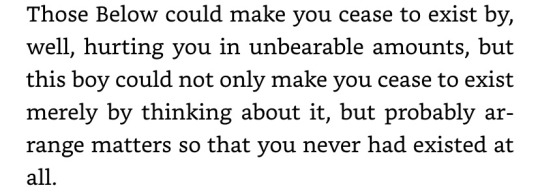
And we’ve also got these quotes of Adam’s:

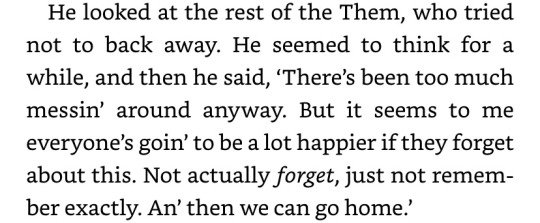
With the result being that, evidently, he does some rewriting himself, and the humans’ memories of that day are not quite exact.
See also the last conversation of Aziraphale’s and Crowley’s we see in the book, which could read as Death messing with their memories once they’ve gotten too close to figuring out something that ought to be ineffable:
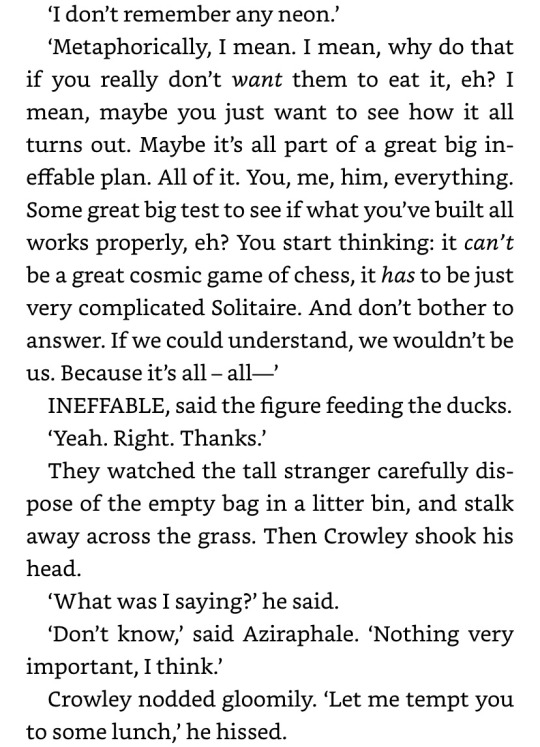
Ultimately, we do know two mechanisms through which memory could not be a particularly reliable means of narration in Good Omens. And memory is such a strong theme this season, that they clearly want us to think of it.
One does not need to actually change events of the past for them to affect the present and thus, the future. They simply need to change how they are remembered.
Know what way there is for someone to never have existed without actually eliminating their existence?
Think of the power a name holds.
Without a name, anonymous deeds could belong to a single person or a hundred. There is no way to ever be certain.
We do not know the name of the gleeful angel who cranked up certain nebulae. Aziraphale doesn’t know, either. He says he remembers the angel Crowley was, but Crowley says that angel is not him.
For Crowley (or Crawley) to never have existed, all that’s necessary is for Aziraphale not to remember his fall. The perception of that being a wrong is at the core of so many grievances he has regarding Heaven, and his determination to right it.
One has to imagine ‘AN ANGEL’ happy, perhaps working on some other important things as they did before without their work ever overlapping. It’s not like that angel had initially cared that much for him at all.
#the people I can talk about Good Omens with are either not done watching season 2 or are sick of me#I was writing this on and off all day so it’s a bit disjointed#this is not meant to be taken as a theory#just a musing on memory#feel free to discuss this with me though#Good Omens#good omens meta#Aziraphale#Crowley#my post#good omens season 2#good omens series 2#good omens 2#(again this is literally for me to find in the future so I’m adding all the tags I can think of)
8 notes
·
View notes